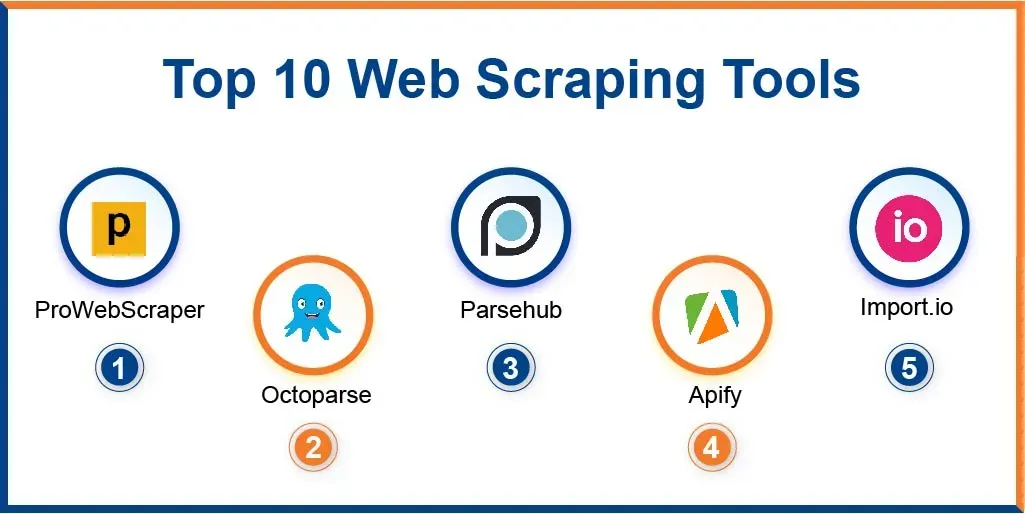Web scraping tools have revolutionized the way individuals and businesses collect data online. Whether you’re looking to automate data extraction techniques or analyze competitor information, these powerful software solutions offer unparalleled efficiency. Understanding web scraping best practices is crucial for anyone eager to learn web scraping, as it ensures that the information collected is both relevant and legally acquired. Many resources can guide you on how to scrape websites effectively, making it easier than ever to harness the vast data available on the internet. As the demand for data-driven insights grows, mastering these tools presents significant advantages in today’s technology-driven marketplace.
In the realm of online data collection, tools designed for harvesting information from websites are invaluable. Often referred to as data mining software or information gathering tools, they empower users to systematically extract and analyze web content. Navigating the intricacies of this technology involves understanding advanced methods for pulling data and adhering to ethical standards for scraping. Those who engage with these systems can drastically enhance their analytical capabilities while adhering to web scraping best practices and legal guidelines. As the digital landscape continues to expand, leveraging these resources becomes essential for any data-centric initiative.
Understanding Web Scraping Tools
Web scraping tools are powerful resources for extracting data from websites without manual effort. They automate the process, making it efficient for users to gather large volumes of information quickly. With a plethora of options available, including both paid and free tools, it’s essential to choose the right software that aligns with your data extraction needs. Popular tools like Beautiful Soup, Scrapy, and Octoparse offer users various functionalities, ranging from simple scraping tasks to complex data extraction projects.
When using web scraping tools, one must follow web scraping best practices to ensure compliance with website terms of service. It’s crucial to respect the website’s robots.txt file, which outlines the allowed paths for scraping. Additionally, being mindful of the server load and adopting techniques such as rate limiting can prevent potential bans from the website. Therefore, learning web scraping techniques not only helps in extracting data efficiently but also in doing so ethically.
Key Data Extraction Techniques for Effective Web Scraping
Data extraction techniques are vital for anyone looking to scrape information from websites. These techniques may include using XPath, CSS selectors, or regular expressions to parse HTML content effectively. By mastering these techniques, users can hone their skills and pull out specific data points, whether it’s product prices, user reviews, or other relevant information that contributes to their research or business strategies.
One of the most significant aspects of successful web scraping is understanding how to structure your data extraction process. This involves planning your scraping project, deciding on the data required, and determining the ideal tools and techniques needed for a successful operation. Platforms that offer tutorials on how to scrape websites typically cover everything from beginner to advanced practices, thus guiding users through their journey of mastering data extraction.
Best Practices for Learning Web Scraping
If you are looking to learn web scraping effectively, following best practices is essential. Start with online courses that provide a solid foundation in programming languages commonly used in web scraping, such as Python or JavaScript. Familiarizing yourself with libraries like Requests or Beautiful Soup will also be beneficial, as they are widely used in web scraping endeavors. Moreover, practice by working on real-world projects to reinforce your learning and help you tackle challenges as they arise.
It’s also important to stay updated on the latest trends and techniques in web scraping. The field is constantly evolving with new tools and methodologies emerging regularly. Engaging with online communities, reading blogs, and following industry experts can significantly enhance your learning experience and keep you informed about the best practices in data extraction.
Choosing the Right Web Scraping Software
Selecting the right web scraping software can significantly impact your data collection efficiency. With so many options available, it’s essential to evaluate your specific needs, such as the complexity of the websites you’re targeting and the volume of data you wish to collect. Tools like ParseHub and Import.io are great for beginners due to their user-friendly interfaces, while more advanced users might prefer Scrapy or Selenium for their robust capabilities.
Additionally, consider the scalability of the software. As your data scraping needs grow, you want a tool that can handle increased workloads without compromising performance. Reviews and user experiences can provide valuable insights into the reliability and effectiveness of various web scraping tools, helping you make an informed decision on your software of choice.
The Importance of Ethical Web Scraping
Ethical web scraping is a critical concern in today’s digital landscape. As web data becomes increasingly valuable, understanding the legal implications of scraping is essential. Always ensure that your scraping activities comply with the site’s terms of service, and be considerate of the content ownership and intellectual property rights. This mindful approach not only protects you legally but also promotes responsible data practices in the community.
Moreover, employing ethical scraping practices means implementing strategies like respecting robots.txt files and using appropriate headers in your requests. This respect for web resources nurtures better relationships between developers and website owners, fostering a more positive online ecosystem. By focusing on ethical principles while using web scraping tools, you contribute to setting standards for how data is extracted and utilized.
Integrating Web Scraping into Business Strategies
Integrating web scraping into business strategies can provide companies with a competitive edge when it comes to market analysis and decision-making. By automating the data extraction process, businesses can gather valuable insights into competitors, customer behaviors, and market trends more effectively. This wealth of data not only aids in crafting precise marketing strategies but also enhances product development and customer engagement.
As organizations recognize the potential of web scraping, many are turning to data analytics teams to leverage extracted data. These teams can analyze trends and glean insights from the collected information, thereby driving business growth. Furthermore, utilizing web scraping tools enables businesses to stay agile and responsive to changes in the market, thereby positioning themselves for ongoing success.
Common Challenges in Web Scraping and How to Overcome Them
Web scraping, while powerful, comes with a set of common challenges that users often face. These can include changes to website structures, CAPTCHAs, and anti-scraping measures implemented by target websites. Such obstacles can disrupt data extraction efforts and require users to constantly adapt their scraping techniques to maintain efficiency. However, understanding these challenges can prepare users to seek solutions, such as configuring scraping scripts to handle variations or implementing automated CAPTCHA-solving techniques.
Moreover, it is essential to build a robust error-handling mechanism into your web scraping process. This approach ensures that if a script encounters an issue, it can either attempt to resolve it or log the error for later analysis. By anticipating potential problems and developing appropriate solutions, users can enhance the resilience of their scraping projects, leading to more consistent and reliable data collection.
Future Trends in Web Scraping Technology
The future of web scraping technology is poised for transformation as advancements in artificial intelligence and machine learning begin to influence the field. These technologies can potentially enhance scraping accuracy, making it easier to extract relevant data from unstructured and semi-structured web formats. Additionally, machine learning algorithms may help in the automatic discovery of data fields, thereby reducing the time required for manual configuration.
Furthermore, as web scraping tools continue to evolve, increased focus on compliance and ethical considerations will likely shape the development of new solutions. Software designers are expected to integrate features that address legal concerns, allowing users to scrape data responsibly while respecting individual privacy rights. Staying abreast of these trends will be crucial for anyone serious about leveraging data extraction techniques in a rapidly changing digital environment.
Getting Started with Web Scraping: A Beginner’s Guide
If you are new to web scraping, starting your journey can be exciting yet daunting. The first step is to familiarize yourself with the basic concepts of HTML and web architecture, as understanding these fundamentals will make the scraping process more intuitive. From there, users can explore various tools and choose one that best suits their level of expertise and project requirements.
A beginner’s guide typically includes tutorials on setting up your first scraping project, writing scripts, and parsing data effectively. Engaging with forums, watching instructional videos, and practicing with sample data can significantly accelerate your learning process. As you progress, consider experimenting with advanced tools and techniques to further expand your capabilities in web scraping.
Frequently Asked Questions
What are the best web scraping tools for beginners?
Some of the best web scraping tools for beginners include Scrapy, Beautiful Soup, and Octoparse. These tools offer user-friendly interfaces and extensive tutorials, making it easier to learn web scraping and apply data extraction techniques.
How can I learn web scraping effectively?
To learn web scraping effectively, start with online courses that focus on data extraction techniques, such as those offered on platforms like Coursera or Udacity. Practice by using various web scraping software to build your own projects and automate data collection.
What are the best practices for using web scraping tools?
Web scraping best practices include respecting website terms of service, avoiding excessive requests to prevent being blocked, and using proper headers to mimic browser requests. It’s also important to handle data responsibly, following legal considerations regarding data usage.
How do I scrape websites using web scraping software?
To scrape websites using web scraping software, first identify the data you want to extract. Next, choose a tool, such as ParseHub or WebHarvy, and configure it to navigate to the target site, select the elements containing your data, and export the results in your preferred format.
What techniques are common in data extraction for web scraping?
Common techniques in data extraction for web scraping include HTML parsing, DOM manipulation, and using APIs. Tools like XPath or CSS selectors can help navigate the structure of web pages to efficiently gather the required information.
| Key Point | Explanation |
|---|---|
| Limitations of Web Scraping | Web scraping tools cannot access or scrape content from certain sites like wsj.com due to restrictions. |
| Learning Web Scraping | Users can learn to extract information using web scraping tools and techniques. |
| Custom Code for Data Fetching | It is possible to write custom code to fetch data from various websites. |
Summary
Web scraping tools are essential for extracting data from the internet, but it’s important to know their limitations. While many sites can be accessed and scraped, some, like wsj.com, have stringent restrictions in place that prevent unauthorized content scraping. Learning how to effectively use web scraping tools and writing custom scripts can greatly enhance your ability to collect valuable data from various online resources.



